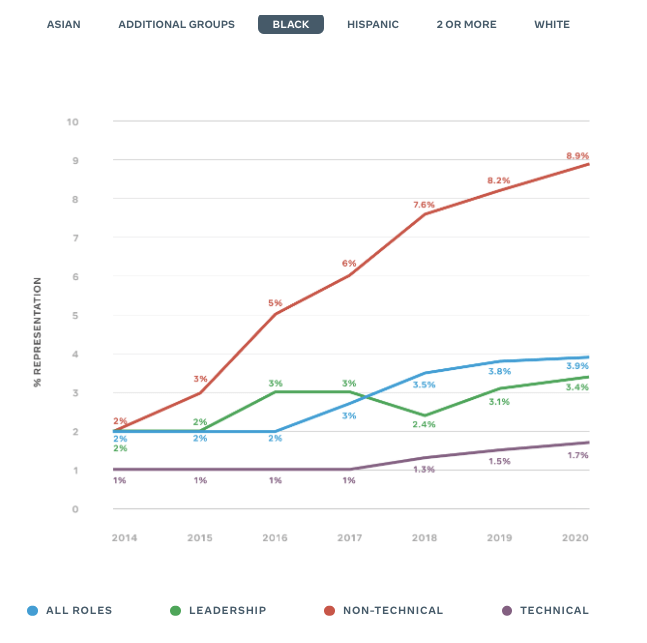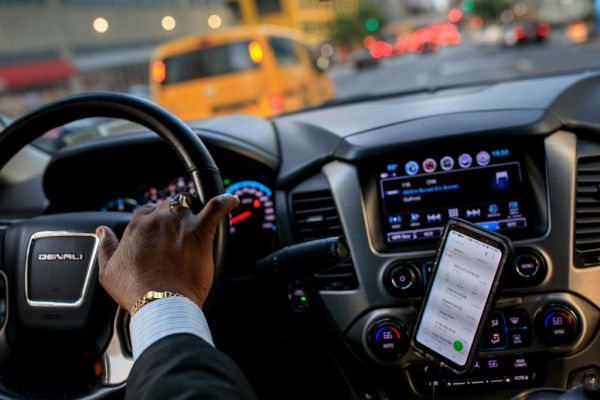Welcome back to Tech at Work, a bi-weekly roundup and analysis of labor, and diversity and inclusion in tech.
This week, we’re looking at Uber’s anti-racism commitment, Shipt shoppers walking off the job, Facebook’s diversity report and Black gig workers organizing against tech companies. Also, hear from CODE2040 CEO Karla Monterroso on tech’s response to the recent racial justice uprising in the U.S.
“There are a lot of really well-intentioned people, but they’re like, ‘Hey, put me in touch with all your Black and Latinx people,” Monterroso told me. “We have definitely gotten requests for free access to our talent pool. What we are talking through with people is even if you had access to that, your ability to make something of that is incredibly limited because the competencies needed to get people into the workforce, promote and retain them are not had by tech companies at this moment.”
Stay woke
Uber commits to being an anti-racist company
Uber’s track record with diversity and inclusion was especially rocky in the days of former CEO Travis Kalanick. The company’s new CEO Dara Khosrowshahi seems to recognize that, saying “you’re probably thinking that Uber is not exactly the company you’d expect to be speaking up on this front.” Still, Uber has made a number of commitments on its journey to being an anti-racist company.
But first, let’s define anti-racist. From Ibram X. Kendi’s book, How to Be An Antiracist:
To be antiracist is to think nothing is behaviorally wrong or right — inferior or superior — with any of the racial groups. Whenever the antiracist sees individuals behaving positively or negatively, the antiracist sees exactly that: individuals behaving positively or negatively, not representatives of whole races. To be antiracist is to deracialize behavior, to remove the tattooed stereotype from every racialized body. Behavior is something humans do, not races do.
Here are some of the most notable of Uber’s commitments:
- Double Black representation in leadership (director roles and higher) by 2025. Currently, Black people make up just 3.3% of Uber’s leadership team, while white people make up 59.9% of it.
- Expand diversity report to include data on intersectionality and self-identification. Race, gender, class, sexual orientation and disability status are highly connected for folks. Intersectionality is the concept that people face multi-faceted layers of discrimination as a result of these intersecting identities.
- Create more opportunities for drivers, delivery people and support staff to advance their careers. Uber has been talking about this at least since 2018.
Related: This past year marked the most interest in anti-racism in the last five years, according to Google Search Trends.

Image Credits: Google Trends/MRD
CODE 2040 CEO Karla Monterroso on racial justice

Image Credits: Code2040
Karla and I caught up briefly this week to talk about CODE 2040’s shift to virtual programming for its fellows, as well as the tech industry’s relationship with diversity and inclusion in light of George Floyd’s killing. As always, she had some gems of wisdom I’d like to share with y’all.
On tech companies being performatively woke
What I will say is immediately after some of those statements came out, I DM’ed a couple of different CEOs whose companies we had some difficulties with to reiterate to them what happened in the partnership, and that I appreciate the commitment, but that I wanted to be clear with them about what had transpired with them in the partnership. A couple of them responded and said they would follow-up, but none of them have.
On tech companies affecting real change post-George Floyd
In terms of forward movement, I think it’s really hard to tell right now because I do think there are a lot more companies asking what to do. I think the ones being quieter about this are doing more than the ones being loud about it. The quiet ones are trying to figure out how to get their house in order. I don’t think we will know the answer to who is taking things seriously and who is really changing for some time, but I will say we have had a much larger inbound. Our inbound has definitely quadrupled.
Facebook’s diversity report is a lot of the same
Facebook released its latest diversity report last week. There’s nothing that is all that surprising, given the company still has a majority white, male workforce. Here are some highlights and lowlights:
Black representation in technical roles has barely budged since 2014, when Black people represented 1% of employees in technical roles compared to just 1.7% in 2020. Facebook has found most success increasing the representation of Black folks in non-technical roles, which tend be lower-paying than their technical and leadership counterparts.

Gig life
#AppBlackOut racial justice protest
A group of Black gig workers in Seattle is calling on Uber, DoorDash, Instacart, GrubHub and Shipt to address racism. Starting today through July 26, the group is calling on workers and customers to not use any of those apps. These workers have four key demands:
- At least minimum wage plus expenses, with a default tip of 20%
- No penalties based on negative customer ratings
- No platform deactivations based on arrest/traffic records
- A system for workers to report discrimination and harassment from businesses and customers
“I get tired of hearing about how much all these tech executives make in one day,” #AppBlackout organizer James Thomas told TechCrunch. “I’m fine with people doing well and making money, as long as they got it without taking advantage of other people and right now, we, Black people who are more dominant in this industry than any other race, are being taken advantage of again. I just want people to be treated fairly.”
Instacart, in a statement to TechCrunch, expressed the care it has for the members of its shopper community. Additionally, the Instacart spokesperson said it’s committed to supporting shoppers. Here’s the full statement:
We care deeply about the members of our shopper community and have always strived to ensure our platform is safe, fair, and reliable for all shoppers. As an organization, we’re working to ensure the diverse voices across our employees, shopper community, customers, and retail partners are heard, represented, and driving actionable change. We’re grateful to the hundreds of thousands of individuals who shop with Instacart as a way to access immediate, flexible earnings opportunities, and as always, we’re committed to ongoing support for our shopper community.
Uber, which now owns Postmates, declined to comment but directed me to a press release about how some social justice groups are supporting Prop 22, the ballot measure that aims to keep gig workers classified as independent contractors.
Shipt shoppers organize a walk-off
Last week, shoppers over at Target-owned grocery delivery service Shipt walked off the job in protest of a new pay structure that they estimate reduces shopper pay by at least 30%. As part of the action, Shipt shopper-organizers asked fellow shoppers to refuse all orders for the day.
“We had to do another action,” Shipt shopper and lead organizer Willy Solis told TechCrunch this week. “I hate to say it that way but it just seems like our efforts have been compounding and growing since we first started. But with every effort we take, we see great advantage in our messaging and organizing and even within Shipt.”
It’s hard to say how many shoppers participated in the action, Solis said, because as of right now, Shipt shopper-activists are not very centralized. However, Solis said people participated all throughout the nation.
“I can confirm that the numbers of shoppers who scheduled themselves to work and the orders we fulfilled were on par and/or higher with what we saw the Wednesday before,” a Shipt spokesperson told TechCrunch.
Moving forward, Solis said the plan is to continue these organizing efforts and create more structure around those efforts.
“We’re starting to localize our efforts in a more focused fashion so that each individual metro can develop leadership,” he said. “This isn’t about me. This isn’t about just our little core group. It’s about all Shipters so we want to give them a platform to voice their local concerns.”
Here’s more from Shipt on the new pay structure:
The updated pay model takes into account the many factors, such as estimated drive time, the number of items in the order, peak shopping windows and location, that can affect the effort needed to shop and deliver an order. This means that some orders may pay out differently than before since payment is based on effort and not on the value of the order.
While some orders may pay more and others pay less in the updated model, we have seen average base pay levels remain consistent overall, and slightly higher in some markets, where we have tested this model. And as always, Shipt Shoppers receive 100% of their tips on top of order pay.
We have a dedicated team that is focused on answering any questions about pay. If shoppers have questions, we encourage them to reach out to us.
